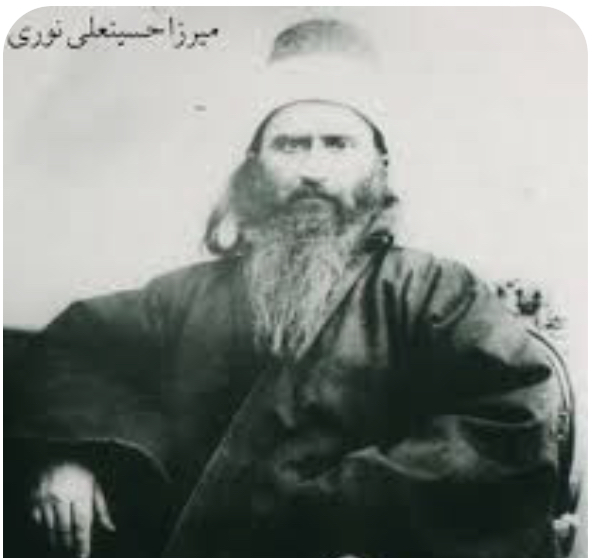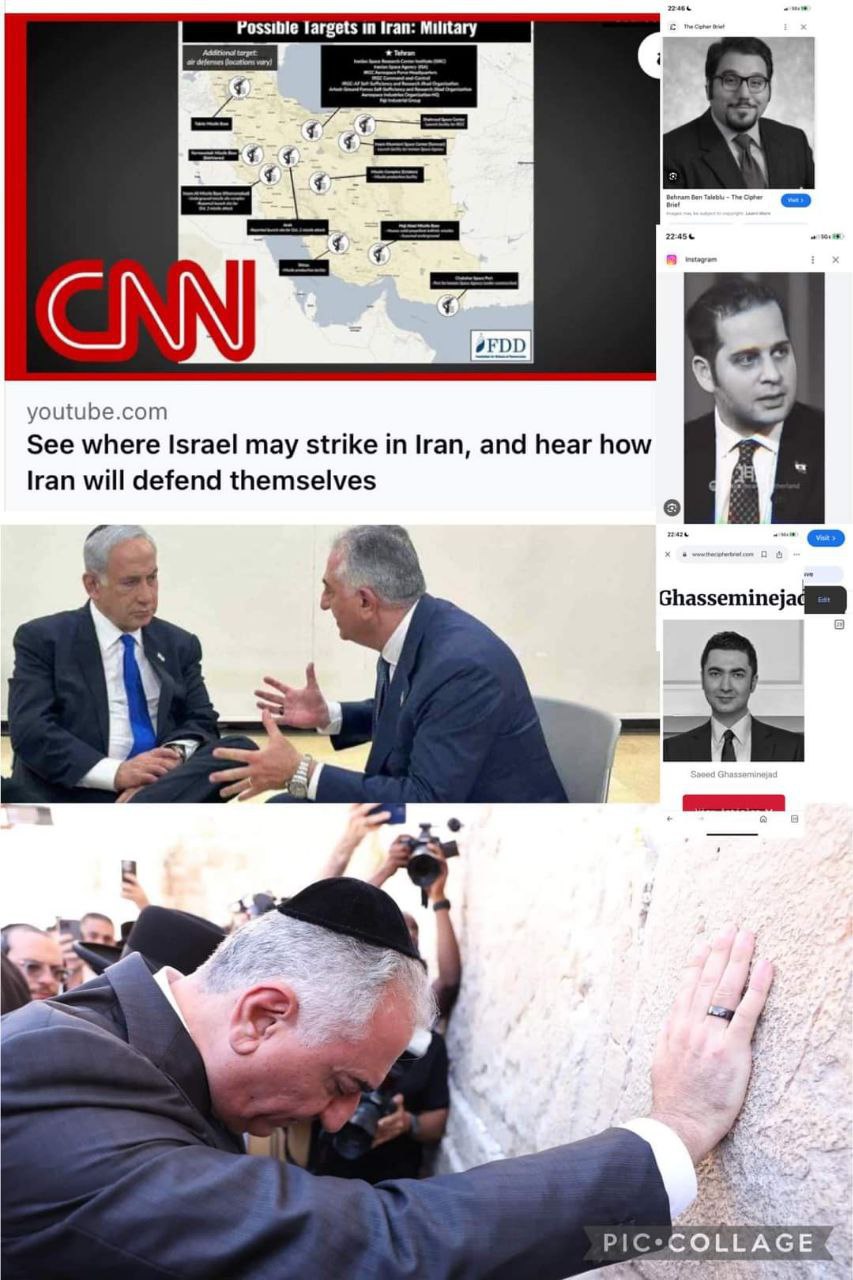Prof. Norman Tivij, one of the political personalities of Israel, wrote in praise of the services of the Baha’is to Israel: “The Baha’i Order, whose center is Haifa and Akast and these two Madinahs are the places of pilgrimage for its followers, has achieved a degree of progress and progress that has made it a global and international religion. For this reason, Baha’is in many countries are spying for the benefit of the Israeli government.
Hojjat-ul-Salam Wal-Muslimeen Ruhollah Hosseinian, head of the Islamic Revolution Documentation Center:
According to the time conditions of Zionist expansionism and the relationship between Iran and Israel, Shiite scholars were most sensitive towards Jews. Regarding the state and provincial associations bill, Imam Khomeini (RA) did not ignore the possibility that “perhaps it was prepared by Jewish and Zionist spies to destroy independence and disrupt the economy and the country.”
Hazrat Imam (RA) and other authorities and scholars believed that Baha’is in Iran are the agents of Israel and this bill is mostly designed for their rule in Iran. The sensitivity of the issue becomes clear when it is known that the Baha’is considered Iran the second land of the Baha’is after Israel and considered it the center of the uprising and conquest of the world. By printing their ten-year map, they showed the importance of Iran for the Baha’is. [1]
Hazrat Imam (RA) addressed the scholars of Yazd and wrote: “Gentlemen should pay attention that many sensitive positions are in the hands of this sect, who are really the workers of Israel. Israel’s danger to Islam and Iran is very close. The agreement with Israel against the Islamic countries has been or will be made. Respected scholars of announcements and sermons should inform other classes so that we can prevent it in time.” [2]
In this message, Imam Khomeini (may Allah be pleased with him) talked about the “facilities that the government has provided for the travel of two thousand or more people from the apostate sect”, along with the payment of foreign currency and a discount on tickets for a seminar that “will be held in London” while In return, they criticized “what problems they do not create for the pilgrims of Baitullah Al-Haram” and took it as evidence of the “bad intentions of the government”. [3]
Not only the Imam (RA) but also the clergy assessed the goal of this bill as the Baha’i rule over Iran’s destiny. Mr. Falsafi, who was considered the spokesman of the clergy at that time, told the government representative: “The purpose of this approval letter is not to allow women to participate in the elections. The company of women is not so important that all clerics revolt against it. This approval letter is a conspiracy against the Holy Prophet (PBUH) and is a basis for destroying the power of the Holy Qur’an and for the domination of the dirty Baha’i elements over the Muslims”.[4]
The analysis of the clergy was based on a historical background and a very accurate prediction. As soon as the Baha’is received the support of the government and dominated the positions, they began to humiliate and impose on Muslims. For example, one of the Baha’is who became the managing director of Ferdowsi store, a Muslim lady who was fasting and wearing a headscarf, mocked her “fasting” and “assigned her to take off the headscarf.” Take him away or his service will be terminated immediately”. [5] With the practical freedom they got, the Baha’is tried to “promote the fashion of clothing or buildings and non-veiling in this country” according to the explicit order of America and London, and they proceeded in such a way that They predicted: “These Muslims will finally be destroyed by the Baha’is and the world of Bahá’u’lláh will prosper”.[6]
On the other hand, the relationship between the Baha’is and Israel was a very close relationship based on common interests with a common enemy called Muslims.
Baha’i and Israel relations go back to before the First World War. The second Baha’i leader, Abbas Effendi (Abdu’l-Bahá), was honored with the title of “Sir” and received the “Knight Hood” medal due to his spying for the British and the services he rendered to the British Army against the Ottoman Muslims in the World War in Acre. [7] Abbas Effendi, who always lived under the support of the British forces stationed in Ottoman and Palestine, was buried in Haifa after his death (1300).
From this date, Haifa, as a holy city of Baha’is, became the center of their gathering. After the establishment of the usurping government of Israel (1327), Shoghi Effendi, the fourth leader of the Baha’is, made the land of Palestine the main center of Baha’ism. The government of Israel was the first government to recognize Baha’ism as an official religion. Shoghi obliged the Baha’i International Council, which he himself founded, to “establish relations with the parents of the Israeli government”.
Prof. Norman Tivij, one of the political personalities of Israel, wrote in praise of the services of the Baha’is to Israel: “The Baha’i Order, whose center is Haifa and Akast and these two Madinahs are the places of pilgrimage for its followers, has achieved a degree of progress and progress that has made it a global and international religion. For this reason, the Baha’is in many countries are spying for the benefit of the Israeli government. [8]
The influence of Baha’i elements in the government organization of Iran started from the time of Reza Shah. Due to his alienation from the body and traditions of Iranian society, Reza Shah “appointed people in important government positions who, like him, were aliens or opposed to this structure. Thus, he employed people affiliated with certain religious groups, especially Babis and Baha’is, in the administration of the bureaucracy, who soon became “the superior political and economic power of Iran”. [9] Reza Shah even appointed a Baha’i major named Asadollah Sanii as a special aide to the crown prince. Sanii later reached the rank of lieutenant and obtained important jobs. [10]
The influence and power of the Baha’is after the fall of Reza Shah caused the reaction of Ayatollah Boroujerdi. Ayatollah Boroujerdi, by supporting Mr. Philosopher’s hard-hitting speeches broadcasted on the radio, started movements against the Baha’is, but with Mohammad Reza Shah’s support for the Baha’is, his anti-Bahá’í movement remained sterile.[11]
The Baha’is had penetrated the government so much that even the Shah’s special physician was a Baha’i officer named Lieutenant General Abdul Karim Ayadi. Ayadi was so much in the court’s attention that he went to the court every day and visited Soraya, the queen of Iran. According to the queen: “His smiles were worth more than all the treatments. When the struggle of the clergy against Baha’ism reached its peak, he stopped visiting Soraya. Soraya became very “worried” and asked the Shah about the matter, the Shah said: “Dr. Ayadi was born in a Baha’i family, and these days the biggest mujtahid in Tehran has incited people against this religious group. It is better not to be sunny in the court for now.” [12] After the rebellion against the Baha’is subsided, Ayadi returned to the court of Iran from Italy and became the most powerful element of Iran’s politics to the extent that Fardost’s general, Yar Shah, wrote: “A book could be written on whether Ayadi Baha’i ruled over Iran or Mohammad Reza. Pahlavi?”[13]
As a result of the regime’s support, the Baha’is gained such rapid growth and influence in the government in a short period of time that according to the report prepared by SAVAK in 2015, the names of 112 officers working in sensitive positions of the army, police and gendarmerie and 56 high-ranking employees It has been mentioned from the ministry to the management. [14] These jobs are the most sensitive positions from the ministry to the head of the army library. It is obvious that the list prepared by SAVAK is not a complete list of Baha’is working in the armed forces and government offices.
In a short time after the White Revolution, the Baha’is occupied important positions. including:
Lieutenant General Asadullah Sanei, Minister of War in Hasan Ali Mansour’s Cabinet.
Amir Abbas Hoyda, Minister of Finance of Hasan Ali Mansour government and the next Prime Minister.
Mansour Rouhani, CEO of Tehran Water Organization, Minister of Water and Electricity and Minister of Agriculture in the government of Hoveda.
Lili Amir Arjamand, Head of the National University Library, Head of the National Oil Library, Farah’s Special Adviser, Director of the Crown Prince’s Educational Programs.
Major General Parviz Khosravani, Deputy General Commander of Gendarmerie in 1343, Deputy Prime Minister and Head of Physical Education Organization during the Hoyda period.
Ataullah Khosravani, Minister of Labor.
Farrokhrou Parsa, Minister of Education.
Dr. Manouchehr Shahqoli, Minister of Health and Parviz Sabeti, Deputy Director of SAVAK.
In a short period of time, the Baha’is grew so much and occupied sensitive jobs that 9 Baha’i ministers were appointed to the Hoyda cabinet.
In addition to occupying sensitive military and political positions, they also dominated many economic resources. Hejbar Yazdani was a famous Baha’i capitalist and shareholder of Iranian Bank and Agricultural Development Bank, and Thabit Pasal was one of the big capitalists of Baha’i Iran. All the shareholders of Zamzam (Pepsi Cola) were Baha’is. Even cultural centers such as Iran TV were managed by Habibullah Thabit Pasal.
The Shah tried so hard to support the Baha’is that the Baha’is claimed: “None of the things that are being done now (year 48) by His Highness Homayun, the Emperor of Ariyamehr, are based on the principles of Islam; Because the king himself is familiar with all Baha’i orders”.[15]
The Baha’is were not only supported by the Shah’s regime, but according to Lieutenant General Asadullah Sanei, “even the President of the United States, Johnson, regularly congratulates the people of Iran.” [16]
Baha’is of Iran, like other Baha’is of the world, considered spying for Israel an honorable duty. They were ecstatic about Israel’s victory and officially said: “The state of Israel is recognized as the world champion in the 1946 and 1947 war. We, the Baha’i community, praise the activity of this dear Jewish people… The progress and advancement of us Baha’is is that we have a spy in every department of Iran and all the ministries, and once a week, when the plans prepared by the government, which reach the breadth of the Emperor Ariamehr, are reported in The context of the project reaches the Bahai spiritual circles”. [17] Based on the same news, Savak also reports that “Given that the Israeli government recognized the Bahai sect as a religion in 1972, it seems that by implementing the program This sect tries to exploit the Baha’i minority in other countries of the world, especially Iran, politically, informationally and economically. [18] The Iranian Baha’is were so arrogant that they collected huge sums of money to help the Israeli army. [19]
The collection of Baha’i documents is an honorable document to prove the accuracy and vigilance of the clergy, especially Imam Khomeini (RA), who recognized the purpose of approving the state and provincial associations bill in 1941 and realized that this bill was for the influence of the Baha’is and that the Baha’is intended to conquer political and economic positions. and their goals are in line with Israel’s goals and spying for them.
Footnotes:
1- Archives of the Islamic Revolution Document Center, Tehran Baha’i file, document number 11, page 190
2- The book of Imam Khomeini (RA), p. 186
3- Dunya newspaper, year 19, number 741, 7/2/1342 reported the departure of two thousand men and women of this sect to London through Mehrabad airport and that the government took five hundred dollars per person at the government rate from the central bank. According to this report, on May 8th, a gathering of 15,000 people will be formed in London to introduce a group of 9 people to the Baha’i leadership. (Quoted by: Mohammad Hassan Rajabi, Political Biography of Imam Khomeini (RA), p. 256)
4- Mohammad Taghi Philosopher, p. 243
5- Archive of Islamic Revolution Document Center, document 20/25176 dated 21/10/45, document number 12 on page 192
6- The same document 7596/H dated 2/18/50, document number 13 on page 193
7- Ismail Rayin, Split in Baha’i, Tehran, Rayin Research Institute, Beta, p. 118
8- The same, pp. 169-170
9- Abdullah Shahbazi, Jewish and Persian emperors, British and Iranian colonialism, Vol. 3, Institute of Political Studies and Research, 1379, p. 78
10- Memoirs of Hossein Fardoost, p. 56
11- Ruhollah Hosseinian, Twenty Years of Shiite Islamic Struggle in Iran, pp. 405-396
12- Soraya Esfandiari, Palace of Solitude, translated by Nad Ali Hamdani, p. 147
13- Memoirs of Hossein Fardoost, p. 302
14- Archive of Islamic Revolution Document Center, Baha’i case, report number 43764/20/H/21, date 9/51/14, document number 14 on page 197
15- Archive of Islamic Revolution Records Center, Baha’i file, Document No. 1242/329 dated 4/5/48, Document No. 15 on page 1985
16- The same, document number 6736/H. dated 2/20/47, document number 16 on page 199
17- The same, document number 6946/H dated 3/11/47, document number 17 on page 201
18- The same, document number 3/700/7/300-13 dated 2/2/52, document number 18 on page 202
19- The same, document number 20/1465/4 dated 5/10/46, document number 19 on page




